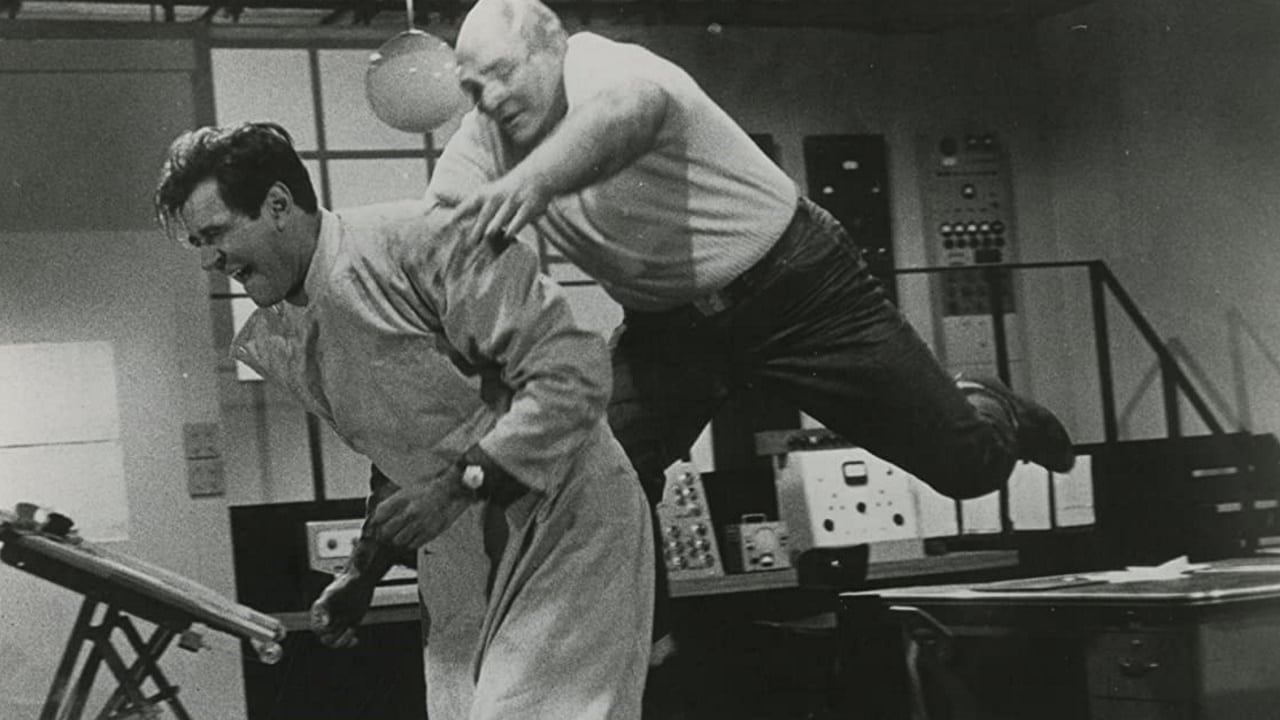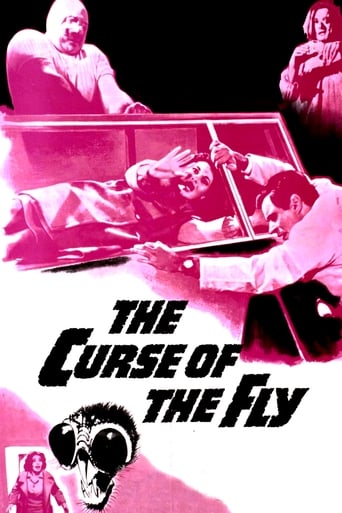

The Delambre name is the only real connection to the first two films of the series. Phillippe is renamed Henri; Henri was the name in the short story not Phillippe but it would have made more sense in this 3rd film to keep his name Phillippe (a lot less confusing that way since it was changed to Henri in the first film).Also do not expect to see any Fly in this film. The teleportation device still has quite a few problems but flies are not one of them anymore. So in a way, this film is only connected to the first two films by the name Delambre and the teleportation device still having troubles. The problem is, with no Fly it's not really a Fly movie anymore, it's not what people are wanting to see which is The Fly.That's not to say this is a bad film because The Fly is not in this movie, it's just not as good as the first two and does not live up to it's name and film poster. It's a deceiving film, cashing in on the success of the first two films.5/10
... View MoreThis is easily the weakest of the original The Fly series. It is the third and final installment and bares little resemblance to its predecessors. In fact, to accommodate its story line, the makers of the film actually change the plot details of the first two films. In The Fly, Andre Delambre, the original scientist to mix fly and human DNA, had a son named Phillipe. Phillipe would then become the main character of the first sequel, Return of the Fly. In the Curse of the Fly, there is no mention of Phillipe and suddenly Andre has a son named Henri. Where he came from, I haven't the slightest. This, as you can plainly see, could confuse viewers who are familiar with the first two films. Imagine Luke Skywalker not appearing in Return of the Jedi and out of nowhere, Darth Vader has a son named Roy. Same thing. It leaves one perplexed throughout a good chunk of the film.Despite this obviously flaw, the story itself isn't that bad, I suppose. Henri and his sons are continuing with Andre's experiment to transport human beings from one place to the other. His one son, Martin, has married and his wife has discovered the botched experiments that had turned his ex-wife and former lab assistances into monsters. At first he tries to convince her she is dreaming all of this (Oh yeah, the film begins with her escaping from a mental hospital), but soon enough he can't disguise the fact that he and his father are mad scientists.The one saving grace of this film is the pathetic attempt to pass off a Caucasian woman as a Chinese servant. She looks more like Katherine Hepurn then Amy Tan, but this embarrassing bit of casting at least brings some camp value to the picture. Again, this picture pails in comparison to The Fly (1958) and Return of the Fly (1959), which are both stellar pieces of early science fiction cinema.And oh yeah, in Curse of the Fly, there is no fly at all to speak of throughout the entire film. Lame. So very lame.
... View MoreDespite the title, there are no flies or fly hybrids in the film other than a photo of the first fly that is briefly shown on the screen. Instead, the film is about the descendants of the scientist from the first film trying to carry on his work--with a few "mistakes" along the way. They, too, are trying to create a matter transference machine but instead of getting mixed with flies, the results were a few deformed people. Instead of dealing with these "freaks" humanely, they just locked them in cells and had their insane servant feed them.Now the fact that there are no fly monsters in the film isn't a bad thing since the plot is still rather interesting and is a pretty decent example of the genre. However, some silly casting and a few clichés don't help it to be all that memorable or worth seeking. Bert Kwouk (of Asian decent) played one servant but the other was played by Yvette Rees who looked about as Asian as a hamster! Also, Carole Gray had a habit of fainting or making stupid choices--making her character seem clichéd and silly. In addition to these odd characters, Brian Donlevy (an old-time Hollywood character actor) and George Baker (a well-respected British actor famous for playing Tiberius in "I, Claudius" as well as many other TV and film roles) are on hand to give the movie some degree of class.Overall, the film has its scary moments but also quite a bit of cheese and flat moments to make it just another 60s horror film. Interesting but far from special.
... View MoreOddly plotted, yet strangely compelling second sequel to The Fly has the next generation of Delambres, Henri(Brian Donlevy)and son Martin(George Baker)still attempting to make their teleportation machine work, with a decent degree of success..they were able to travel from Quebec to London, but not without consequences. Martin is plagued with rapid aging unless he is injected with a serum and Henri suffers from radiation burns. Three lab assistants, including Martin's wife Judith(Mary Manson)were tragically altered by mutations due to trips through the teleportation device. Henri has a second son in London, Al(Michael Graham)who operates the other teleportation device, but is conflicted and disturbed with his father's disregard for the lives affected by the experiments. Al is fed up, and longs for a happy, normal life away from teleportation devices and labs. Martin makes a rather bad decision when he marries Patricia Stanley(Carole Gray), a patient who broke free from an asylum(in the bizarre opening title sequence, quite a weird way to open a sequel to The Fly)..Pat is in the asylum due to a nervous breakdown as a result of the death of an overbearing mother demanding her to excel at playing the piano. Henri is alarmed at Martin's marriage due to the risk of their experiments being disrupted. The plot thickens because Henri and Martin keep Judith and their student lab assistants, now monstrous mutations, locked in sheds like diseased animals! Even worse is Wan(Yvette Rees, in poor oriental make-up), the wife of the Delambres' Chinese assistant Tai(Burt Kwouk)who is repulsed at Martin's decision to re-marry even though he's still attached legally to Judith. Wan responds by secretly tormenting Pat by reminding her of Judith's presence, with Henri and Martin covering up her treatment by saying she is merely having bad dreams. Pat begins to question her own sanity, while Wan(who I believed was in love with Judith;it just seems that way, I could be wrong)continues to torture her in manipulative ways. Soon, a detective, Inspector Ronet(Jeremy Wilkins)..called to find the whereabouts of Pat by Madame Fournier, the head of the mental institution..begins to delve into the history of the Delambre threatening the whole teleportation operation. Tragic results spurn from Henri's insistence to continue as Wan stupidly releases Judith from her cage...Certainly flawed, but I found it rather fascinating for some reason..maybe it's the way the story is arranged. The make-up of the mutated victims is terrible. Yet, I felt director Don Sharp made a rather entertaining little feature despite the material's limitations. That opening credits with shattering glass exploding at the screen, with Carole Gray escaping with nothing but undergarments, running ins slow motion is certainly an eye-opener. You have that angle of an emotionally disturbed, yet quite beautiful, young woman entering the life of a scientist who is weakened by aging that attacks with such painful force(George Baker makes it look like a heart-attack was occurring), experimenting with his father on transporting humans from one place to another instantaneously. The scientist is actually already married to a woman he keeps locked up in a shed, has completely disregarded her, his father who has turned a blind eye to the effects of their experiments because of his undaunted desire to see his family's legacy completed. This is a lot of drama, not even including Wan and her antics throwing everything out of proportion. I think the film's strongest scene is at the end when Henri must get rid of the two lab assistants, having his son Al commit a dirty deed that puts all the madness into perspective. Clouded by his mad, dogged desire to see the teleportation experiments succeed(and especially removing themselves from the possibility of being apprehended by the police for their illegal conduct, amoral decisions and treatment towards victims of their failed science)Henri will do whatever it takes, no matter what consequences result. Not a successful film, but an interesting failure. I never thought it was boring, that's for sure.
... View More